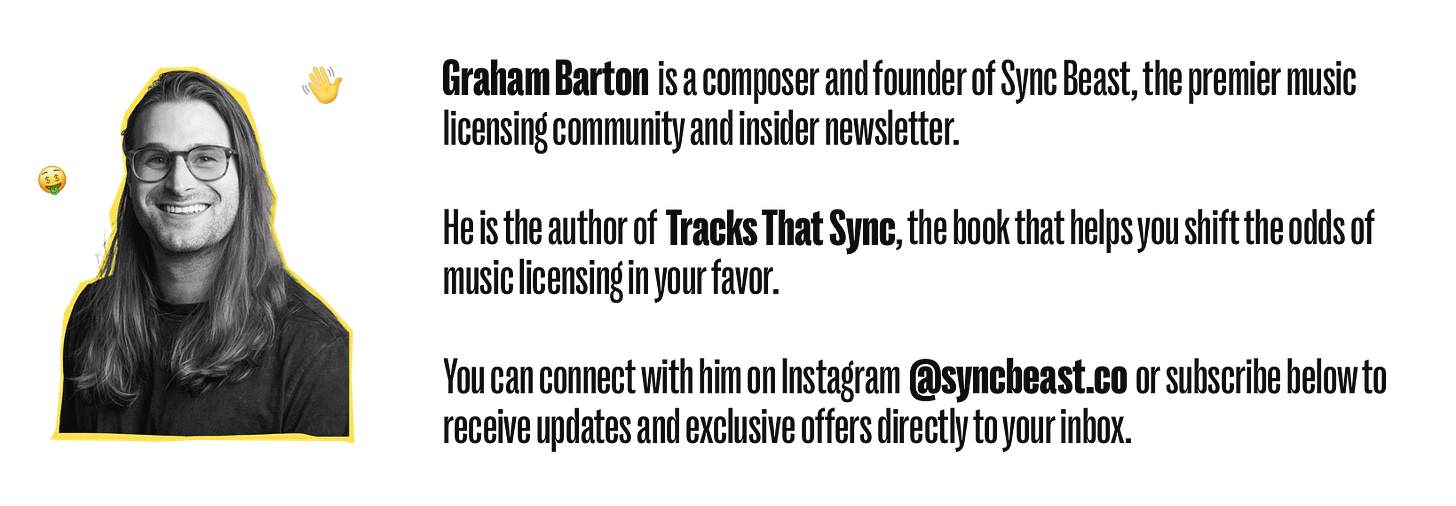"Why Don't My Tracks Sync?"
Spoiler alert: You're asking the wrong question.
Composers:
Ever finished a track and said these exact words?
“Damn, this is gonna sync…”
Certainty is the game changer when it comes to growing your income as a composer. A big hurdle I help composers overcome is their uncertainty when writing tracks for sync. They may have a knack for melody or a particular genre, but it doesn’t always allow them to write tracks that big brands actually want to license.
It comes as no surprise when I listen to their work and it lacks the DNA required to place in big brand advertisements – which is often a symptom of their workflow. Most tracks that I give feedback on usually fit into three buckets that help identify opportunities to improve.
Let’s dive in:
You have no creative strategy.
Inspiration doesn’t always come easy. In fact, a song you overhear at a restaurant is more likely to inspire you than when you sit down to write a track in your own studio. And that’s OK. The next step is to learn why.
A lot of my actionable inspiration comes when I'm away from the cockpit. That is, producing, recording, editing, and mixing all at once bogs down my writing process. Many of my valuable tracks began as fragmented voice memos away from the studio, and that makes perfect sense. I wasn’t pulled in different directions by other creative responsibilities while writing.
I make a point to lean into this workflow by recording my ideas for sync in places away from the computer: over coffee, at Disney World, or at the grocery store, for example. Try removing your writing hat from the confines of your studio more often. It may feel unnatural or awkward at first, but it will never be worse than sitting in your studio chair wondering why the creative juices aren't flowing.
You’re not writing with the end user in mind.
You’re great at writing what you write and that’s wonderful, but not everyone in the world wants what you have to offer. A track that you think is 'good' can often miss the people with money. And it forces them to spend their money on someone else's track that they think is 'good' for their project. Without understanding where your track fits into the grand scheme of the production process, the sync game will eat you alive. Period.
The end user wants to be hooked on the first listen. The end user wants the feeling of discovery as your track unfolds. The end user wants to be inspired by how your track speaks to a feeling or story. When your tracks fail to give creatives this kind of experience, their chances of getting pitched to a big brand campaign plummets. How can you start serving the end user, instead of your own creative passions?
You’re writing is too broad or generic.
Let’s face it – No one wants to be called ‘generic’ in their artistic lifetime. So why do composers jump into sync and think it’ll be easy? It's likely because they heard ‘generic’ music in a TV spot that seemed easy to make. Here is how to avoid being that composer: The more specific or sophisticated your tracks are, the more likely they will attract big brand syncs.
Sync is not a game for the masses. When you write a track for every type of ad or industry, you write a track for no one. By favoring specificity, you repel a ton of other ideas, styles, and creative instincts in the process. In turn, you clarify the purpose of your track so that it can better align with a brand’s message or need. Your track’s laser focus and clarity comes from your ability to say “NO” to adding a whole bunch of ideas to the pot. Stop adding ketchup to your birthday cake mix – Nobody wants it.
How do you stack up?
Which bucket do your tracks fall into? One? Two? Maybe you hit the jackpot with all three. If so, you should consider it a win. You now have a launch pad for where to go next. You're one step closer to discovering what you need to inject into your creative workflow so that you can crank out some irresistible tracks with certainty.
It doesn’t matter if you have your process dialed, or if you're hungry for new ways to find inspiration… When composing for sync, your main goal is to STOP writing boring tracks that have no chance of licensing. The end user doesn’t care how you make a valuable track, whether it’s in your studio lined with blue LED lights or humming into a voice memo on your way to the post office.
When you leverage a strategy to write tracks that serve one specific purpose and align with what licenses today, you instantly shift the odds of sync in your favor.
Certainty gets you syncs – Without it, you miss.
All my best,
Graham Barton
Composer · Mentor · Imperfectionist
@syncbeast.co




